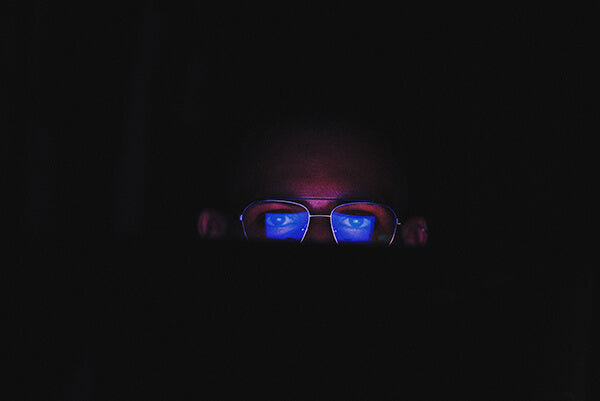Light significantly impacts our sleep and overall health. Blue light, in particular, can have detrimental effects on eye health. Electronic screens are major sources of blue light, but even energy-saving lamps used for home lighting can emit this harmful glare. While reducing screen time is an effective way to manage blue light exposure, this isn’t always practical due to work, school, and our increasingly digital lives. As a result, blue light glasses have become a popular solution to shield our eyes from the invisible but potentially damaging blue light emitted by digital screens.

But first, let's define what blue light is.
What is Blue Light?
When we think about light, we often imagine sunlight or the white fluorescent lamps used to brighten our homes. However, "white light" is composed of a spectrum of different colors, including blue light. Blue light is a specific part of this spectrum and is primarily emitted by two sources: LED screens (such as those on tablets, smartphones, or computers) and the sun itself.

Why Wear Blue Light Glasses?
Wearing blue light glasses is an effective way to protect your eyes from the daily exposure to blue light. If you spend long hours in front of a computer or TV screen, blue light glasses can help prevent eye strain and discomfort. Scientific research indicates that excessive exposure to blue light can potentially cause irreversible damage to your eyes, including an increased risk of developing cataracts.
Can You Wear Blue Light Glasses All Day?
Absolutely! You can wear blue light glasses all day without any adverse effects. In fact, wearing them throughout the day can offer enhanced protection for your eyes, especially if you spend significant time in front of screens for work or leisure. Even those with limited screen time can benefit from the protective effects of blue light blocking coatings. Adding a blue light filter to your glasses can help safeguard your eyes throughout the day and in daily use.

How Do Blue Light Glasses Work?
Blue light glasses are equipped with special filters in the lenses that either absorb or block blue light from passing through. When you wear these glasses while using screens, especially in low-light conditions, they help reduce your exposure to blue light. By filtering out this high-energy light, blue light glasses can minimize the potential damage to your eyes.
Scientific tests have shown that blue light glasses can effectively decrease the intensity of blue light emitted by devices like smartphones, confirming that the right pair of blue light glasses can reduce the harmful effects of prolonged screen use.

When to Wear Blue Light Glasses
Blue light glasses are designed to reduce the strain caused by prolonged exposure to blue light from digital screens. To maximize their benefits, it's important to wear them during times when you are exposed to blue light. This includes:
- Watching TV
- Browsing on a smartphone or tablet
- Working on a computer
By wearing blue light glasses during these activities, you can help minimize eye strain and potential damage caused by blue light. These glasses are also effective in filtering out ultraviolet rays and radiation, offering additional protection to your eyes.








































